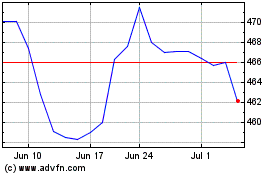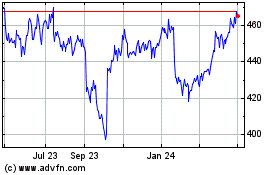Want to Invest in Space? Try These ETFs -- Journal Report
May 08 2021 - 9:29AM
Dow Jones News
By Bailey McCann
Thematic ETFs, exchange-traded funds that focus on specific
investment themes, are booming And one of the most-talked-about
themes lately is space. There is no shortage of ways to invest in
the final frontier.
The classics
Historically, the way to invest in space has been in aerospace
and defense ETFs.
Before Elon Musk was shooting cars into orbit, space exploration
was a purely governmental affair. Aerospace and defense companies
were building the rockets, and many of them still are.
Funds with large positions in companies like Boeing, Lockheed
Martin or Northrop Grumman tend to have lower volatility and
turnover than funds focused on the newer, high-growth companies
that compete in space. Aerospace and defense ETFs come in both
actively managed and passive, or index, varieties. On the passive
side, iShares U.S. Aerospace & Defense ETF (ITA) and SPDR
S&P Aerospace & Defense ETF (XAR) offer broad exposure to
the old guard of companies in this sector and low turnover. ITA has
an expense ratio of 0.44% and XAR 0.35%.
On the active side, the leveraged fund Direxion Daily Aerospace
& Defense Bull 3X Shares (DFEN) is designed for short-term
investing. This fund's goal is to provide triple the daily return
of the Dow Jones U.S. Select Aerospace & Defense Index; but it
can also triple the losses if the market goes the other way. You'll
also have to pay up for it: With an expense ratio of 0.99%, DFEN is
more expensive than an unleveraged ETF. Leveraged ETFs have grown
in popularity with investors in recent years, but it is best to
work with your financial adviser to determine whether a short-term
fund is best for your thematic investment goals.
The innovators
The space industry is still small relative to other parts of the
economy. But a number of high-profile private and listed companies
have emerged recently, with both a public-sector and consumer focus
on space -- including Mr. Musk's SpaceX, Jeff Bezos' Blue Origin,
and Virgin Galactic, founded by Richard Branson.
Even companies like Dish Network have a significant investment
in space through their use of low-orbit satellites to enhance
television and internet service. The launch of the U.S. Space Force
in 2019 has also opened a new avenue for government contracts for a
broader range of companies.
Two SPDR funds will give you passive or index-fund access to the
innovators -- SPDR S&P Kensho Future Security ETF (FITE) and
SPDR S&P Kensho Final Frontiers ETF (ROKT).
FITE has an expense ratio of 0.45% and invests in companies that
are focused on new areas of national-security importance, including
space. FITE is a bit of a combo platter in that it offers exposure
to companies that will respond to many of the mandates of the Space
Force. The fund has a mix of investments in aerospace and defense,
cybersecurity, drone development -- a range of companies that are
going to have a space tie-in even if they aren't making rockets or
supplying parts for rockets.
ROKT, meanwhile, is not a pure space play. The fund invests in
companies that explore "deep space and the deep sea," according to
its fact sheet. The fund's current investment weighting is about
66% aerospace and defense (or space), and 34% research, industrial
materials and other components used in space and deep-sea
exploration -- companies such as Hexcel Corp., which makes
high-performance composite materials and other components used in
both types of exploration. The fund has an expense ratio of
0.45%.
Procure Space ETF (UFO) from ProcureAM offers the most direct
exposure to space innovators. UFO invests only in companies that
derive a majority of their revenue from space. You'll get access to
Virgin Galactic in UFO, but also Dish, Sirius XM and Weathernews --
companies with significant investments in satellites for consumer
use. UFO is a bit pricier with an expense ratio of 0.75% and does
invest in smaller space-focused companies. which may be more
volatile.
Finally, the newest entrant: ARK Invest's ARK Space Exploration
& Innovation ETF (ARKX) will give you exposure to the
innovators and adjacent companies that are poised to benefit from
space exploration. Because ARKX has a broader mandate, you'll get
access to Virgin Galactic but also companies like Deere & Co.
which will benefit from improvements in GPS and other satellite
technologies. ARKX is actively managed, so the holdings may change
over time and the expense ratio is the same as UFO at 0.75%.
Ms. McCann is a writer in New York. She can be reached at
reports@wsj.com.
(END) Dow Jones Newswires
May 08, 2021 09:14 ET (13:14 GMT)
Copyright (c) 2021 Dow Jones & Company, Inc.
Lockheed Martin (NYSE:LMT)
Historical Stock Chart
From Mar 2024 to Apr 2024

Lockheed Martin (NYSE:LMT)
Historical Stock Chart
From Apr 2023 to Apr 2024
